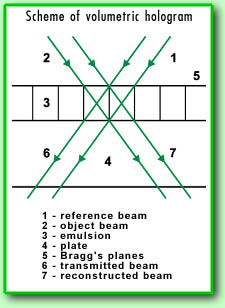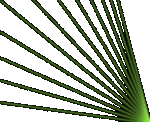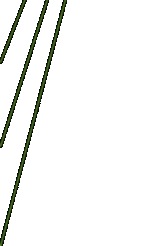|
If
we write down the hologram in some volumetric medium, the received model of a standing
wave reproduces, for sure, not only amplitude and phase, but also spectral distribution of
the radiation, written down on it. This circumstance was necessary as a basis of making of
the three-dimensional (volumetric) holograms.
As
a basis of operation of the volumetric holograms
the Bragg's diffraction  effect
is used: as a result of an interference of waves,
propagating through thick emulsion, the
planes lighted by light of the greater intensity
are formed. After processing of the hologram on
the lighted planes the layers of a blackening are
formed. As a result of it the "Bragg planes"
are created which have property to reflect light
partially. I.e. in an emulsion the three-dimensional
interference figure is created. effect
is used: as a result of an interference of waves,
propagating through thick emulsion, the
planes lighted by light of the greater intensity
are formed. After processing of the hologram on
the lighted planes the layers of a blackening are
formed. As a result of it the "Bragg planes"
are created which have property to reflect light
partially. I.e. in an emulsion the three-dimensional
interference figure is created.
Such
thick-layer hologram provides effective reconstruction of an object wave if the
angle of incidence of a reference beam at recording and reconstruction remains constant.
The change of a wave length of light is not supposed also at reconstruction. Such
selectivity of the volumetric transmission hologram allows to write down on a plate up to
several tens images, changing the angle of indicence of a basic beam accordingly at
recording and reconstruction.
The
scheme of recording of the transmission volumetric holograms is same as the
Leith-Upatnieks's scheme for the two-dimensional holograms.
At
reconstruction of the volumetric hologram, as against the flat transmission holograms,
only one image is forming due to reflection from the hologram of a reconstructing beam
only in one direction determined by Bragg's angle.-->
|





